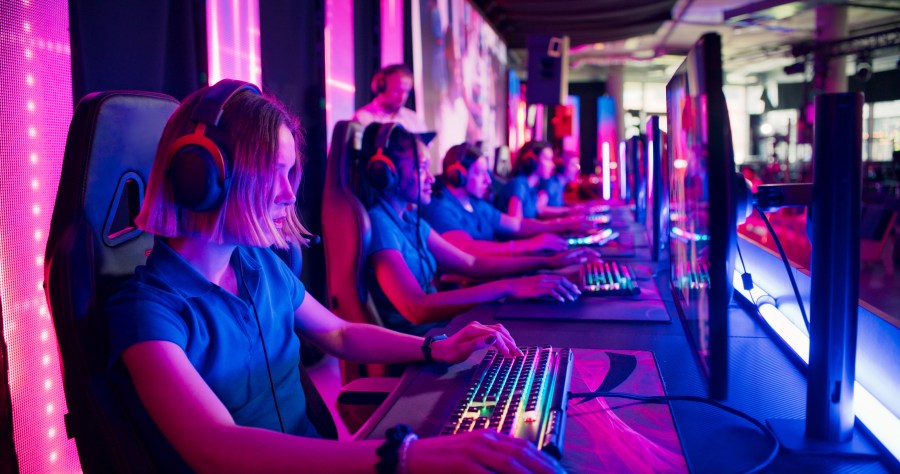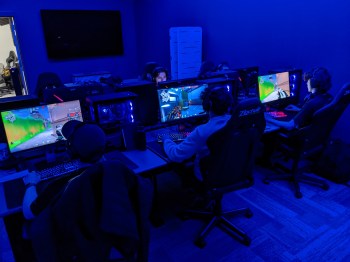Diversity among esports athletes is slowly increasing

Professional video gaming — otherwise known as esports — has grown into a billion-dollar industry.
Esports tournaments draw crowds of tens of thousands to watch players compete at games like Valorant and League of Legends while top esports athletes earn millions of dollars.
But for too long this industry has been dominated by men, like so many facets of the gaming world. A 2019 report showed that just 5% of professional esports players were women — a statistic that seemingly hasn’t changed much in years.
Heather Garozzo, an esports veteran who played under the gamer ID sapphiRe, remembers how rare it was to be a woman competing in live esports tournaments in the mid-2000s.
“I didn’t have to tell people what I looked like when I was going to meet someone at an event because ‘Look for the woman and then and you’re gonna find me,'” Garozzo recalled.
That didn’t stop her. By her own admission, Garozzo is fiercely competitive. She entered esports after seeing her brother and his friends play in esports tourneys.
Unfortunately, there are still few women participating in these competitions, especially at the highest level.
There “is actually a pretty big difference between the people on the stages and the number of women who are actually playing online at home,” said Morgan Romine, co-director of the nonprofit research and advocacy group AnyKey.
Romine estimates at least 30% of gamers are women or girls who potentially deal with cultural misconceptions about whether they have the ability to compete in the top tier.
That can lead to a lot of online harassment and toxicity, which can push them away from esports in general. “So you have fewer women who are even entering the pipeline in the first place,” Romine said.
But the esports scene and gaming in general appear to be changing when it comes to demographics.
“While our data shows more men playing games or watching esports than women, that gap is getting a lot smaller,” said Tom Morris, trends manager at market research firm GWI.
Support for women who want to be in esports — whether it’s playing the game, working as a broadcaster or managing teams — is growing too.
That aid ranges from community-organized tournaments and support networks to game developers themselves launching support programs for minority esports athletes in recent years.
All of this is having an effect, at least from Heather Garozzo’s point of view. Although retired from playing esports, she’s still active in the scene as head of Raidiant, which provides resources to the women-in-gaming community.
“When I go to tournaments now, I am blown away by the number of women,” Garozzo said. “Just to watch as friends is incredible. That didn’t exist back in the day.”
Maybe with time, we’ll see more women on the esports stage.
Related links: More insight from Meghan McCarty Carino
Gender disparity among esports athletes is also evident in college scholarships. A couple of years ago, a report from the Associated Press found that 90% of college esports scholarships went to men.
Esports doesn’t really fall under a governing body like the NCAA to set specific rules around this kind of issue. The AP report points out it could fall under Title IX, the federal law that prohibits sex discrimination at educational institutions that receive federal dollars.
But this year in a Title IX case involving the Florida Institute of Technology, a federal judge ruled it doesn’t apply to esports.
In that case it was actually the men’s rowing team that sued the school for discrimination after it tried to shift the program to a club sport.
Florida Tech had argued that its roster of male athletes was proportionate to the student body when including its new esports program, which enrolls mostly men.
But U.S. District Judge Carlos Mendoza ruled that the school could not count those players as athletes under Title XI because “esports does not require athletic ability.”
His words!
The future of this podcast starts with you.
Every day, the “Marketplace Tech” team demystifies the digital economy with stories that explore more than just Big Tech. We’re committed to covering topics that matter to you and the world around us, diving deep into how technology intersects with climate change, inequity, and disinformation.
As part of a nonprofit newsroom, we’re counting on listeners like you to keep this public service paywall-free and available to all.
Support “Marketplace Tech” in any amount today and become a partner in our mission.


















